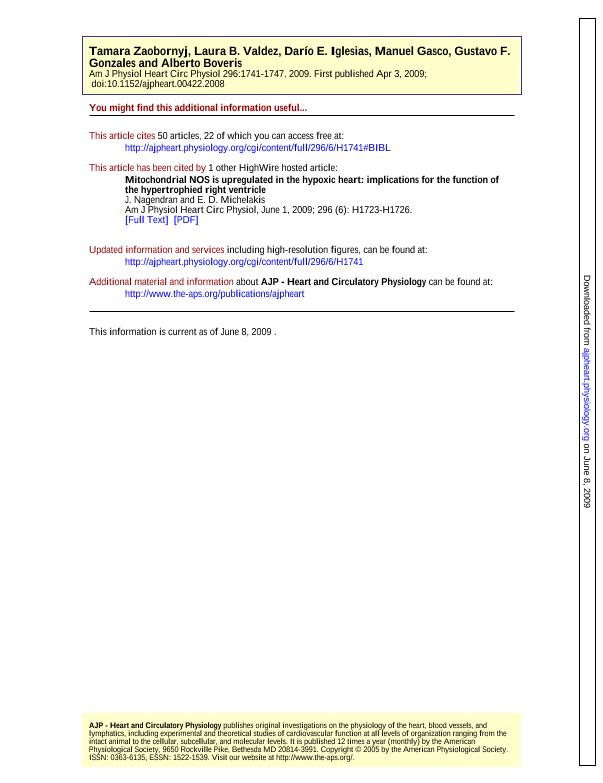Artículo
Mitochondrial nitric oxide metabolism during rat heart adaptation to high altitude: effect of sildenafil, l -NAME, and l -arginine treatments
Zaobornyj, Tamara ; Valdez, Laura Batriz
; Valdez, Laura Batriz ; Iglesias, Dario Ezequiel
; Iglesias, Dario Ezequiel ; Gasco, Manuel; Gonzales, Gustavo F.; Boveris, Alberto Antonio
; Gasco, Manuel; Gonzales, Gustavo F.; Boveris, Alberto Antonio
 ; Valdez, Laura Batriz
; Valdez, Laura Batriz ; Iglesias, Dario Ezequiel
; Iglesias, Dario Ezequiel ; Gasco, Manuel; Gonzales, Gustavo F.; Boveris, Alberto Antonio
; Gasco, Manuel; Gonzales, Gustavo F.; Boveris, Alberto Antonio
Fecha de publicación:
06/2009
Editorial:
American Physiological Society
Revista:
American Journal of Physiology - Heart and Circulatory Physiology
ISSN:
0363-6135
Idioma:
Inglés
Tipo de recurso:
Artículo publicado
Clasificación temática:
Resumen
Mitochondrial nitric oxide metabolism during rat heart adaptation to high altitude: effect of sildenafil, L-NAME, and L-arginine treatments. Am J Physiol Heart Circ Physiol 296: H1741–H1747, 2009. First published April 3, 2009; doi:10.1152/ajpheart.00422.2008.—Rats submitted to high altitude (Cerro de Pasco, Peru´, 4,340 m, PO2 12.2 kPa) for up to 84 days showed a physiological adaptive response with decreased body weight gain (15%), increased right ventricle weight (100%), and increased hematocrit (40%) compared with sea level animals. These classical parameters of adaptation to high altitude were accompanied by an increase in heart mitochondrial enzymes: complexes I-III activity by 34% and mitochondrial nitric oxide synthase (mtNOS) activity and expression by 75%. The hyperbolic increase for mtNOS activity during adaptation to high altitude was similar to the observed pattern for hematocrit. Hematocrit and mtNOS activity mean values correlated linearly (r2 0.75, P 0.05). Chronic treatment for 28 days with sildenafil (50 mg kg1 day1 ) decreased the response of mtNOS to high altitude by 25%. Conversely, NGnitro-L-arginine methyl ester treatment (8.3 mg kg1 day1 ) increased such response by 40%, whereas L-arginine treatment (106 mg kg1 day1 ) had no effect. Nitric oxide (NO) production by mtNOS accounts for 49% of total cellular NO production in sea level rats and for 54% in rats exposed to high altitude for 84 days. It is concluded that mtNOS is a substantial source of cardiac NO, a factor in the adaptive response to sustained heart hypoxia that is susceptible to be modified by pharmacological treatments.
Archivos asociados
Licencia
Identificadores
Colecciones
Articulos(IBIMOL)
Articulos de INSTITUTO DE BIOQUIMICA Y MEDICINA MOLECULAR
Articulos de INSTITUTO DE BIOQUIMICA Y MEDICINA MOLECULAR
Citación
Zaobornyj, Tamara; Valdez, Laura Batriz; Iglesias, Dario Ezequiel; Gasco, Manuel; Gonzales, Gustavo F.; et al.; Mitochondrial nitric oxide metabolism during rat heart adaptation to high altitude: effect of sildenafil, l -NAME, and l -arginine treatments; American Physiological Society; American Journal of Physiology - Heart and Circulatory Physiology; 296; 6; 6-2009; H1741-H1747
Compartir
Altmétricas



